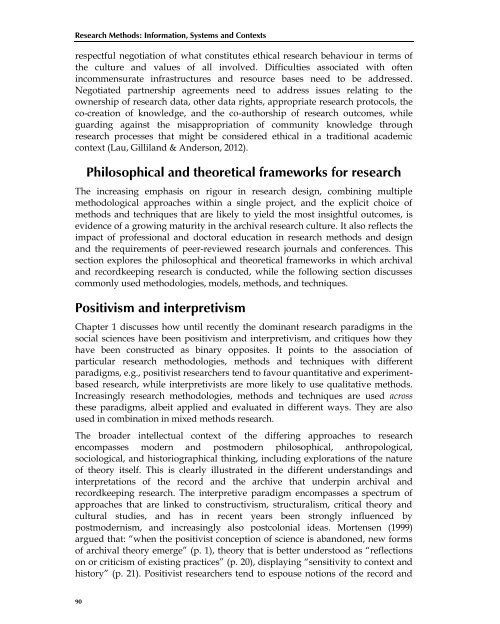Archival and recordkeeping research
Archival and recordkeeping research
Archival and recordkeeping research
Create successful ePaper yourself
Turn your PDF publications into a flip-book with our unique Google optimized e-Paper software.
Research Methods: Information, Systems <strong>and</strong> Contexts<br />
respectful negotiation of what constitutes ethical <strong>research</strong> behaviour in terms of<br />
the culture <strong>and</strong> values of all involved. Difficulties associated with often<br />
incommensurate infrastructures <strong>and</strong> resource bases need to be addressed.<br />
Negotiated partnership agreements need to address issues relating to the<br />
ownership of <strong>research</strong> data, other data rights, appropriate <strong>research</strong> protocols, the<br />
co-creation of knowledge, <strong>and</strong> the co-authorship of <strong>research</strong> outcomes, while<br />
guarding against the misappropriation of community knowledge through<br />
<strong>research</strong> processes that might be considered ethical in a traditional academic<br />
context (Lau, Gillil<strong>and</strong> & Anderson, 2012).<br />
90<br />
Philosophical <strong>and</strong> theoretical frameworks for <strong>research</strong><br />
The increasing emphasis on rigour in <strong>research</strong> design, combining multiple<br />
methodological approaches within a single project, <strong>and</strong> the explicit choice of<br />
methods <strong>and</strong> techniques that are likely to yield the most insightful outcomes, is<br />
evidence of a growing maturity in the archival <strong>research</strong> culture. It also reflects the<br />
impact of professional <strong>and</strong> doctoral education in <strong>research</strong> methods <strong>and</strong> design<br />
<strong>and</strong> the requirements of peer-reviewed <strong>research</strong> journals <strong>and</strong> conferences. This<br />
section explores the philosophical <strong>and</strong> theoretical frameworks in which archival<br />
<strong>and</strong> <strong>recordkeeping</strong> <strong>research</strong> is conducted, while the following section discusses<br />
commonly used methodologies, models, methods, <strong>and</strong> techniques.<br />
Positivism <strong>and</strong> interpretivism<br />
Chapter 1 discusses how until recently the dominant <strong>research</strong> paradigms in the<br />
social sciences have been positivism <strong>and</strong> interpretivism, <strong>and</strong> critiques how they<br />
have been constructed as binary opposites. It points to the association of<br />
particular <strong>research</strong> methodologies, methods <strong>and</strong> techniques with different<br />
paradigms, e.g., positivist <strong>research</strong>ers tend to favour quantitative <strong>and</strong> experimentbased<br />
<strong>research</strong>, while interpretivists are more likely to use qualitative methods.<br />
Increasingly <strong>research</strong> methodologies, methods <strong>and</strong> techniques are used across<br />
these paradigms, albeit applied <strong>and</strong> evaluated in different ways. They are also<br />
used in combination in mixed methods <strong>research</strong>.<br />
The broader intellectual context of the differing approaches to <strong>research</strong><br />
encompasses modern <strong>and</strong> postmodern philosophical, anthropological,<br />
sociological, <strong>and</strong> historiographical thinking, including explorations of the nature<br />
of theory itself. This is clearly illustrated in the different underst<strong>and</strong>ings <strong>and</strong><br />
interpretations of the record <strong>and</strong> the archive that underpin archival <strong>and</strong><br />
<strong>recordkeeping</strong> <strong>research</strong>. The interpretive paradigm encompasses a spectrum of<br />
approaches that are linked to constructivism, structuralism, critical theory <strong>and</strong><br />
cultural studies, <strong>and</strong> has in recent years been strongly influenced by<br />
postmodernism, <strong>and</strong> increasingly also postcolonial ideas. Mortensen (1999)<br />
argued that: “when the positivist conception of science is ab<strong>and</strong>oned, new forms<br />
of archival theory emerge” (p. 1), theory that is better understood as “reflections<br />
on or criticism of existing practices” (p. 20), displaying “sensitivity to context <strong>and</strong><br />
history” (p. 21). Positivist <strong>research</strong>ers tend to espouse notions of the record <strong>and</strong>


